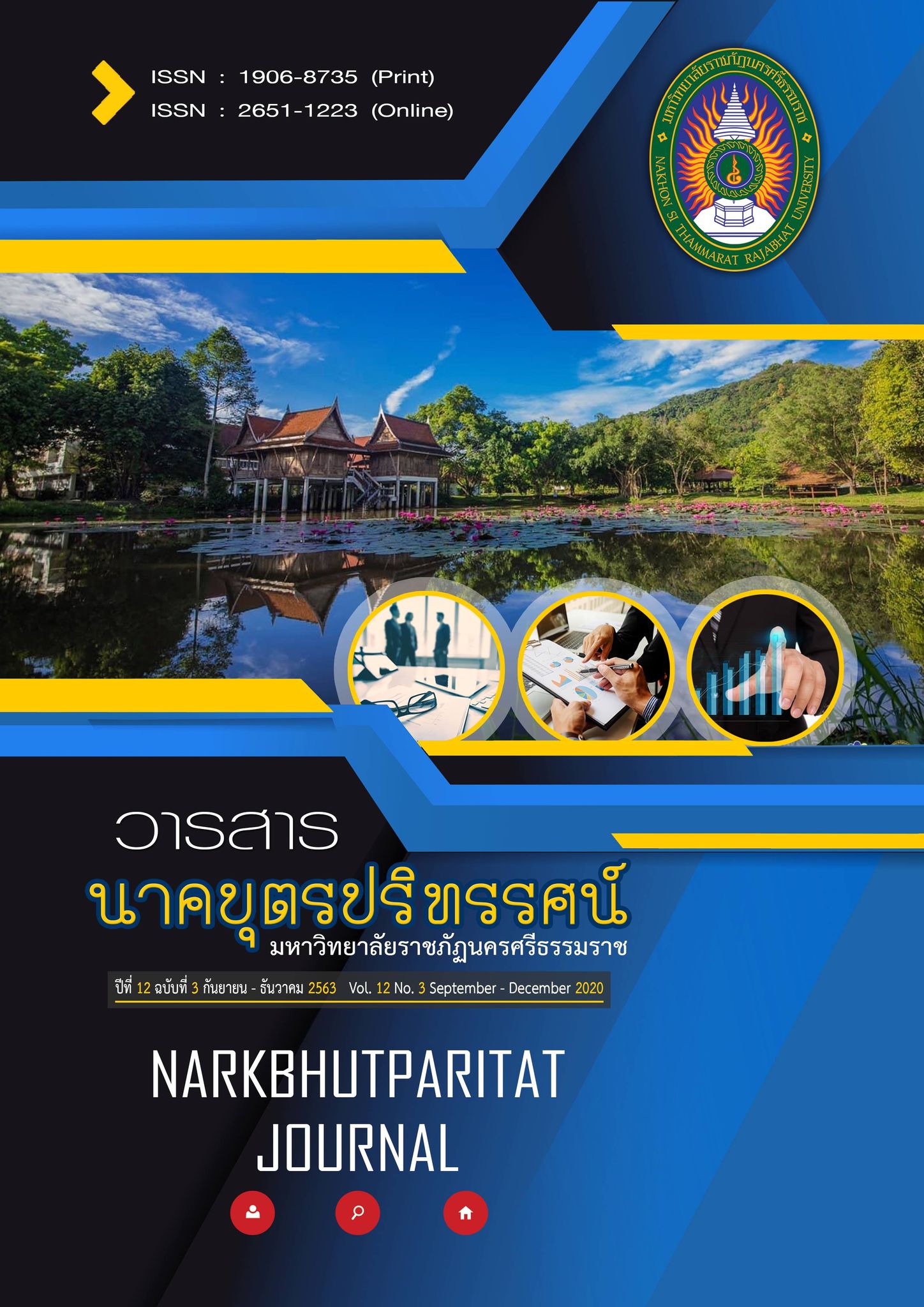การพัฒนากรอบเชิงโครงสร้างเพื่อการอธิบายความหมายและความสัมพันธ์ระหว่าง คำสำคัญทางการศึกษาที่ปรากฏในนโยบายการศึกษา : การวิจัยเชิงปฏิบัติการแบบมีส่วนร่วม
Main Article Content
บทคัดย่อ
การสร้างความเข้าใจที่ตรงกันในคำสำคัญทางการศึกษาระหว่างระดับนโยบายกับระดับปฏิบัติเป็นเรื่องที่สำคัญต่อการพัฒนาการศึกษาทั้งระบบ บทความฉบับนี้มีวัตถุประสงค์เพื่อ 1) สำรวจความรู้สึก อารมณ์ และ/หรือความคิดเห็นของผู้มีส่วนร่วมวิจัยที่มีต่อคำสำคัญทางการศึกษาที่ปรากฏในระดับนโยบาย 2) วิเคราะห์แบบรูปความรู้สึก อารมณ์ และ/หรือความคิดเห็นของผู้มีส่วนร่วมวิจัย และ 3) สังเคราะห์กรอบเชิงโครงสร้างที่เป็นตัวเชื่อมโยงตลอดแนวคำสำคัญทางการศึกษา โดยใช้การวิจัยเชิงปฏิบัติการแบบมีส่วนร่วมซึ่งเกิดขึ้นในการอบรมเชิงปฏิบัติการโดยมีคณะผู้วิจัยเป็นวิทยากรหรือกระบวนกรตั้งแต่ปี พ.ศ. 2556 จนถึง พ.ศ. 2562 ผู้มีส่วนร่วมวิจัยเป็นครูระดับปฏิบัติการทั้งสายอาชีวศึกษาและสายสามัญ ข้อมูลจากด้านความรู้สึกและความคิดเห็นที่มีต่อคำสำคัญทางการศึกษาได้มาจากการการสนทนากลุ่ม การสังเกต และการจดบันทึก ผลการวิเคราะห์แบบรูปการตอบสนองของผู้มีส่วนร่วมวิจัยด้วยแบบจำลองทางพฤติกรรมแสดงให้เห็นว่า แนวโน้มการตอบสนองชี้ไปในทางลบเป็นส่วนมากหรือมีความเข้าใจที่ไม่ตรงกัน กรอบเชิงโครงสร้างที่ถูกสร้างขึ้นมีชื่อเรียกว่า ‘พีระมิดสถาปัตยกรรมทางการศึกษา’ และสามารถจัดเรียงคำสำคัญทางการศึกษาอย่างเป็นระบบ ผลการใช้พีระมิดในการอบรมเชิงปฏิบัติการตั้งแต่ปี พ.ศ. 2559 เป็นต้นมา ช่วยให้ผู้มีส่วนร่วมวิจัยเกิดความเข้าใจใหม่ที่ตรงกันและตอบสนองในทางบวก
Article Details
เอกสารอ้างอิง
Ampansirirat, A. and Wongchaiya, P. (2017). The Participatory Action Research: Key Features and Application in Community. Journal of Humanities and Social Sciences, Mahasarakham University. 36(6), 192-202.
Bell, D., Morrison-Love, D., Wooff, D. and McLain, M. (2018). STEM education in the twenty-first century: learning at work-an exploration of design and technology teacher perceptions and practices. International Journal of Technology and Design Education. 28(3), 721-737.
Bertram, V. (2014). STEM or STEAM? We’re Missing the Point. Retrieved 2020, January 4, from https://www.huffpost.com/entry/stem-of-steam-were-missin_b_5031895.
Chunin, M. (2015). Emotional expressions at workplace of employees. Journal of Faculty Of Applied Arts, 8(1), 106-114. (in Thai)
Damasio, A. (2003). Looking for Spinoza, Joy, Sorrow and the Feeling Brain. Alexandria, VA: A Harvest Book Harcourt.
Gerlach,J. (2012). STEM: Defying a Simple Definition. Retrieved 2020,January 6,from https://www.nsta.org/publications/news/story.aspx?id=59305.
Huasin, W.N.F.W., Arsad, N.M., Othman, O., Halim, L., Rasul, M.S., Osman, K., and Iksan, Z. (2016). Fostering students’ 21st Century Skills through Project Oriented Problem Based Learning (POPBL) in Integrated STEM Education Program. Asia-Pacific Forum on Science Learning and Teaching, 17(1), Article 3. https://www.eduhk.hk/apfslt/ download/
issue1_files/fadzilah.pdf
Khalil, N.M. and Osman, K. (2017). STEM-21CS Module: Fostering 21st Century Skills through Integrated STEM. K-12 STEM Education, 3(3), 225-233.
Kijkuakul, S. (2015a). STEM Education. Journal of Education Naresuan University, 17(2), 201-207. (in Thai)
Kijkuakul, S. (2015b). STEM Education (Part II). Journal of Education Naresuan University, 17(3), 154-160. (in Thai)
Kijkuakul, S. (2018). Qualitative Research: a Distinguished Paradigm and Misconceptions. Journal of Education Naresuan University, 20(1), 272-283. (in Thai)
Latoontheerakool, N. (n.d.). PLC: Professional Learning Community. Retrieved 2020, Janury 3, from http://www.bangkok.go.th/upload/user/00000077/SS/4.0.pdf. (in Thai)
Manee-on, S. (2017). Using Professional Learning Community Strategies in Schools. Journal of Education, Silpakorn University, 15(1), 28-39. (in Thai)
Marzano, R. J. and Kendall, J. S. (2007). The New Taxonomy of Educational Objectives. ThousandOaks. California: Corwin Press, Inc.
Office of the Education Council, Ministry of Education. (2016). STEM Education: Science, Technology, Engineering, and Mathematics Education. Retrieved 2020, Janury 5, from http://www.thaiedresearch.org/index.php/home/paperview/26/?topicid=6. (in Thai)
Sinek, S., (2009). Start with Why: How Great Leaders Inspire Everyone to Take Action. New York: Portfolio.
Siripatharachai, P. (2013). STEM Education and 21st Century Skills Development. Executive Journal, 33(2), 49-56. (in Thai)
Sirindhorn Science Home (SSH). (n.d.). Fabrication Lab. Retrieved 2019, October 23, from https://www.nstda.or.th/ssh/home-fab-lab.html. (in Thai)
STEM Education Thailand. (2014). Introduction to STEM Education. Retrieved 2020, January 5, from http://www.stemedthailand.org/wp-content/uploads/2015/03/newIntro-to-STEM.pdf.pdf. (in Thai)
Suwanich, C. (2017). STEM Education and Learning Management for Teacher Student to Provide 21st Century Learner’s Characteristics Under Thailand Policy 4.0. Journal of Education, Silpakorn University, 15(1), 18-27. (in Thai)
Vehachart, R. (2018). Monitoring and Evaluation Development Activity of Professional Learning Community (PLC) in the Southern Network, founded by the Teachers Council of Thailand in 2016. Veridian E-Journal, Silpakorn University, 11(1), 2099-2115. (in Thai)


